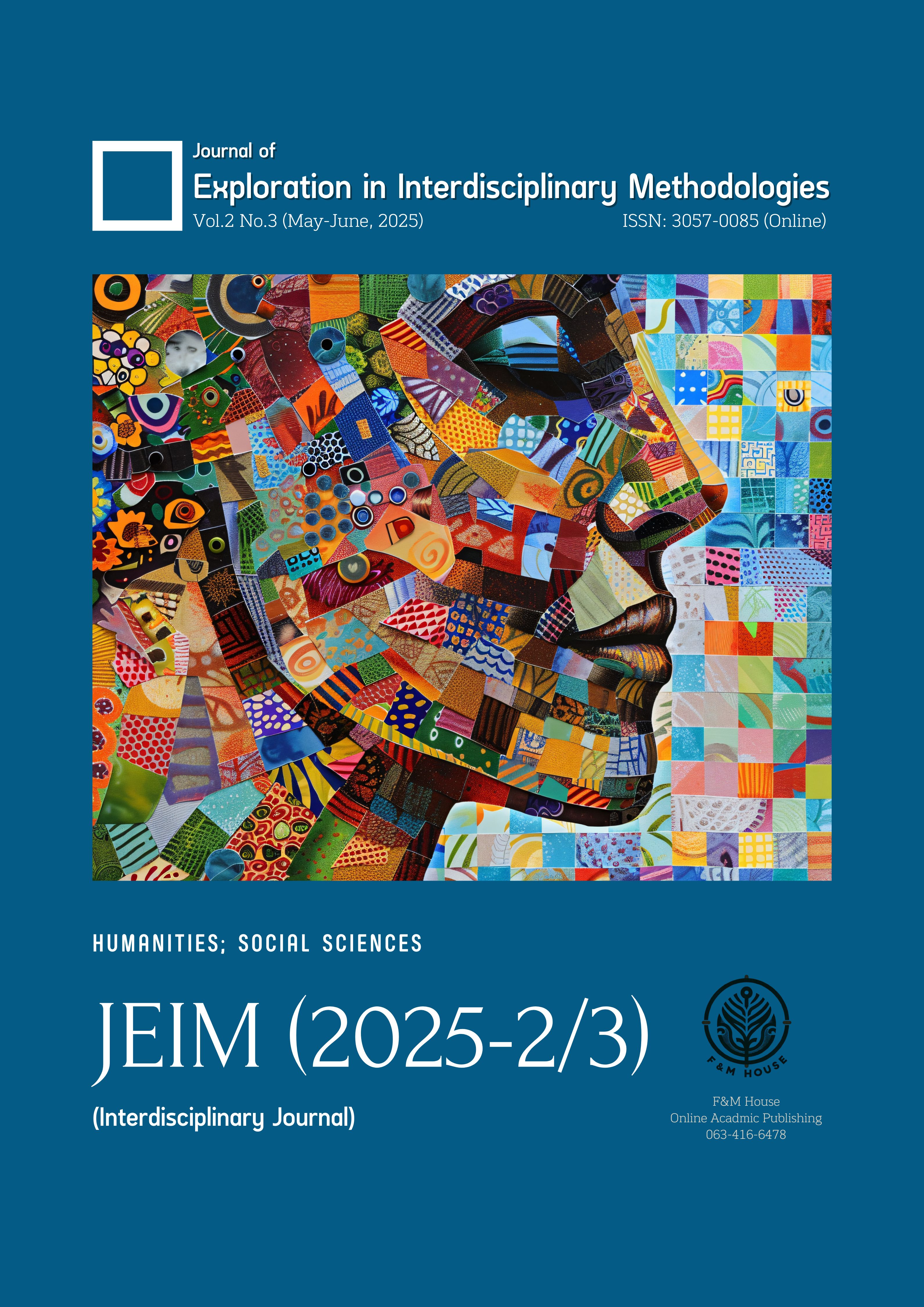Artificial Intelligence and Human Consciousness: Philosophical and Religious Perspectives
คำสำคัญ:
Artificial Intelligence, Human Consciousness, Philosophy of Mind, AI Ethics, Religious Perspectives on AIบทคัดย่อ
This paper explores the philosophical and religious perspectives on artificial intelligence (AI) and human consciousness, examining the implications of AI’s evolving capabilities in relation to self-awareness, moral agency, and spiritual identity. The rapid development of AI raises fundamental questions about the nature of consciousness, challenging long-held philosophical distinctions between mind and matter, as well as theological concepts of the soul. Drawing from diverse philosophical traditions, including dualism, emergentism, and physicalism, this study investigates whether AI can possess consciousness or merely simulate human cognitive processes. Additionally, the paper discusses religious interpretations of AI’s role in human life, considering perspectives from Buddhism, Christianity, and other spiritual traditions regarding the ethical implications of machine intelligence. Through an interdisciplinary approach, this paper aims to deepen the understanding of AI’s impact on human identity, free will, and moral responsibility. Ultimately, it calls for a balanced integration of technological advancements with ethical and spiritual considerations to navigate the challenges posed by AI in contemporary society.
เอกสารอ้างอิง
Al-swmaeai, K. A. (2024). Exploring the intersection of technology and artificial intelligence in English literature: A critical analysis. Al-Noor Journal for Humanities. Retrieved from https://www.semanticscholar.org/paper/9bd7135d71c62199a5b17e3dde0d300c4a4a65ae
Barnes, E., & Hutson, J. (2024). Contemplating existence: AI and the meaning of life. CORE. Retrieved from https://core.ac.uk/download/618332248.pdf
Bing, S. (2023). Artificial intelligence and Chinese philosophers. CORE. Retrieved from https://core.ac.uk/download/582653538.pdf
Blythe, M. C. (2023). An analysis of the suitability of philosophy as a core K-12 public school subject. George Fox University Digital Commons. Retrieved from https://digitalcommons.georgefox.edu/cgi/viewcontent.cgi?article=1221&context=edd
Bostrom, N. (2013). Existential risk prevention as global priority. Global Policy, 4, 15-31. Retrieved from https://doi.org/10.1111/1758-5899.12002
Brom, F. W. A., Cohen, N. E., & Stassen, E. N. (2009). Fundamental moral attitudes to animals and their role in judgment: An empirical model to describe fundamental moral attitudes to animals and their role in judgment on the culling of healthy animals during an animal disease epidemic. CORE. Retrieved from https://core.ac.uk/download/pdf/29248912.pdf
Casadei, D. (2024). Risible. University of California Press eBooks. Retrieved from https://doi.org/10.1525/9780520391345
Chesterman, S. (2020). Artificial intelligence and the limits of legal personality. International and Comparative Law Quarterly, 69, 819-844. Retrieved from https://doi.org/10.1017/s0020589320000366
Chua, J. M. (2017). Formulating consciousness: A comparative analysis of Searle’s and Dennett’s theory of consciousness. CORE. Retrieved from https://core.ac.uk/download/143474409.pdf
Côrtes Cavalcante, D. (2024). Beyond consciousness in large language models: An investigation into the existence of a "soul" in self-aware artificial intelligences. CORE. Retrieved from https://core.ac.uk/download/599343293.pdf
Deane-Drummond, C. (1999). Futurenatural? A future of science through the lens of wisdom. CORE. Retrieved from https://core.ac.uk/download/364046.pdf
Dochkov, I. A. (2024). Postmodernism and neurotheology: Some current issues around the phenomenon of religious experience. Postmodernism Problems. Retrieved from https://www.semanticscholar.org/paper/e9cf680a025fe318a51cf9fc0b5157273724308e
Donath, J. (2006). The imperfect observer: Mind, machines, and materialism in the 21st century. CORE. Retrieved from https://core.ac.uk/download/pdf/86793.pdf
Dorobantu, M. (2024). Could robots become religious? Theological, evolutionary, and cognitive perspectives. CORE. Retrieved from https://core.ac.uk/download/622031182.pdf
du Toit, C. W. (2016). Some Barthian perspectives on the present science-religion debate: What is the place of "natural theology" today? CORE. Retrieved from https://core.ac.uk/download/478410130.pdf
Echeverría Esparza, P. (2023). The hegemonic character of techno-functional neo-immanentism and its relationship with culture wars. CORE. Retrieved from https://core.ac.uk/download/586380277.pdf
Ess, C. (2004). "Revolution? What revolution?" Successes and limits of computing technologies in philosophy and religion. CORE. Retrieved from https://core.ac.uk/download/pdf/12236873.pdf
Ess, C., Strasser, A., Lancaster, K., Friedman, C., Nyholm, S., & Frank, L. (2022). Social robotics and the good life. Transcript Verlag eBooks. Retrieved from https://doi.org/10.1515/9783839462652
Ford, J. L. (2000). Buddhism, Christianity, and The Matrix: The dialectic of myth-making in contemporary cinema. CORE. Retrieved from https://core.ac.uk/download/232763198.pdf
Fourcade, M., & Gordon, J. (2020). Learning like a state: Statecraft in the digital age. Journal of Law and Political Economy, 1. Retrieved from https://doi.org/10.5070/lp61150258
Franklin, J. (2019). Emergentism as an option in the philosophy of religion: Between materialist atheism and pantheism. CORE. Retrieved from https://core.ac.uk/download/231876717.pdf
Fuller, S. (2021). Nietzschean meditations: Untimely thoughts at the dawn of the transhuman era. Perspectives on Science and Christian Faith, 73, 121-122. Retrieved from https://doi.org/10.56315/pscf6-21fuller
Gabriel, M., Horn, C., Katsman, A., Krull, W., Lippold, A. L., Pelluchon, C., & Venzke, I. (2022). Towards a new enlightenment - The case for future-oriented humanities. The New Institute.Interventions. Retrieved from https://doi.org/10.14361/9783839465707
Galitsky, V. (2025). Physics-metaphysics duality: Exploring the limits of human understanding. Retrieved from https://core.ac.uk/download/561030248.pdf
Gall, D. (2021). Some problems of philosophy. Retrieved from https://doi.org/10.29173/oer20
Gladden, M. E. (2019). Who will be the members of society 5.0? Towards an anthropology of technologically posthumanized future societies. Social Sciences, 8(5), 148. Retrieved from https://doi.org/10.3390/socsci8050148
Glavanakova, A. (2017). The age of humans meets posthumanism: Reflections on Don DeLillo's Zero K. Studies in the Literary Imagination, 50(1), 91-109. Retrieved from https://doi.org/10.1353/sli.2017.0007
Gualeni, S. (2020). Artificial beings worthy of moral consideration in virtual environments: An analysis of ethical viability. CORE. Retrieved from https://core.ac.uk/download/305120535.pdf
Gurov, O. (2024). Metamorphosis of society: The potential impact of cyborgian technologies on social relations. CORE. Retrieved from https://core.ac.uk/download/631305325.pdf
Halapsis, A. V. (2019). Gods of Transhumanism. Retrieved from https://core.ac.uk/download/286357466.pdf
Hayles, N. K. (2018). Chaos bound. Cornell University Press eBooks. Retrieved from https://doi.org/10.7591/9781501722950
Heltzel, P. (2012). Cog and the creativity of God. Retrieved from https://open.bu.edu/bitstream/2144/3937/1/2.3-jfse-1998-heltzel.pdf
Hunt, H. T. (2019). Intimations of a spiritual new age: III. Martin Heidegger’s phenomenology of numinous/being experience and the “other beginning” of a futural planetary spirituality. Retrieved from https://core.ac.uk/download/232898879.pdf
Jensen, C. B., & Blok, A. (2013). Techno-animism in Japan: Shinto cosmograms, actor-network theory, and the enabling powers of non-human agencies. Theory Culture & Society, 30(1), 84-115. Retrieved from https://doi.org/10.1177/0263276412456564
Kastrup, B. (2016). The physicalist worldview as neurotic ego-defense mechanism. Retrieved from https://core.ac.uk/download/131214150.pdf
Kelly, I. W. (2025). The grateful un-dead? Philosophical and social implications of mind-uploading. Retrieved from https://core.ac.uk/download/334415870.pdf
Krämer, S. (2015). Medium, messenger, transmission. Amsterdam University Press eBooks. Retrieved from https://doi.org/10.1515/9789048524990
Kurilovich, I., Golubov, M., Perova, N., & Zanina, A. (2024). Artificial intelligence as a metaphor, object, and subject of philosophical analysis. Voprosy Filosofii. Retrieved from https://www.semanticscholar.org/paper/4ead8a6456a42f7ae070ac556effccf5de8f197a
Kušić, M., & Nurkić, P. (2019). Artificial morality: Making of the artificial moral agents. Retrieved from https://core.ac.uk/download/287612226.pdf
Kwiatkowski, F. (2016). Let us make ROBOT in our image, according to our likeness: An examination of robots in several science fiction films through the Christian concept of the "image of God". Retrieved from https://core.ac.uk/download/227054547.pdf
Lan, X., & Shu, H. (2024). The breakthrough of philosophy of mind in the construction of artificial intelligence concepts in Marxist philosophy. Trans/Form/Ação. Retrieved from https://www.semanticscholar.org/paper/8f7ff61dd630c9d05203ea90271a814486102b08
Linson, A. (2016). Machine art or machine artists? Dennett, Danto, and the expressive stance. Retrieved from https://core.ac.uk/download/153326672.pdf
Livingston, S., & Risse, M. (2019). The future impact of artificial intelligence on humans and human rights. Ethics & International Affairs, 33, 141-158. Retrieved from https://doi.org/10.1017/s089267941900011x
Lumbreras, S., Oviedo, L., & Vestrucci, A. (2021). Can AI help us to understand belief? Sources, advances, limits, and future directions. Retrieved from https://core.ac.uk/download/523306491.pdf
McGrath, J. F. (2011). Robots, rights and religion. Retrieved from https://core.ac.uk/download/62435400.pdf
Metzler, T. (2012). And the robot asked "What do you say I am?" Can artificial intelligence help theologians and scientists understand free moral agency? Retrieved from https://open.bu.edu/bitstream/2144/3969/1/4.4-jfse-2000-metzler.pdf
Morrow, J. L. (2019). Constructing nineteenth-century religion: Literary, historical, and religious studies in dialogue. The Ohio State University Press eBooks. Retrieved from https://doi.org/10.26818/9780814213971
Müller, V. C. (2021). Is it time for robot rights? Moral status in artificial entities. Ethics and Information Technology, 23, 579-587. Retrieved from https://doi.org/10.1007/s10676-021-09596-w
Nakada, M. (2012). Robots and privacy in Japanese, Thai and Chinese cultures: Discussions on robots and privacy as topics of intercultural information ethics in ‘Far East’. Retrieved from https://core.ac.uk/download/pdf/12237646.pdf
Newberg, A. (2022). What defines a person? Religion, Brain & Behavior, 12(4), 462-465. Retrieved from https://www.semanticscholar.org/paper/5939a39bdde6d0eefbc02404e1a546a6ea79bf10
Öhman, C., & Floridi, L. (2017). The political economy of death in the age of information: A critical approach to the digital afterlife industry. Minds and Machines, 27, 639-662. Retrieved from https://doi.org/10.1007/s11023-017-9445-2
Ott, B. L. (2016). The age of Twitter: Donald J. Trump and the politics of debasement. Critical Studies in Media Communication, 34(1), 59-68. Retrieved from https://doi.org/10.1080/15295036.2016.1266686
Puzio, A. (2023). Robot, let us pray! Can and should robots have religious functions?: An ethical exploration of religious robots. Retrieved from https://core.ac.uk/download/596816795.pdf
Ripley, S. (2025). Robot consciousness: Physics and metaphysics here and abroad. Retrieved from https://core.ac.uk/download/199235606.pdf
Sanguineti, J. J. (2015). Trends in philosophy of mind and philosophy of neuroscience. Retrieved from https://core.ac.uk/download/131203037.pdf
Shapiro, A. N. (2024). Decoding digital culture with science fiction. Digitale Gesellschaft. Retrieved from https://doi.org/10.14361/9783839472422
Shea, B. (2017). The problem of evil in virtual worlds. Retrieved from https://core.ac.uk/download/131215374.pdf
Shirazi, B. (2012). Integral Review Vol 8 No 1 July 2012 full issue. Retrieved from https://core.ac.uk/download/217366259.pdf
Silva Guimarães, L. D., Martins Da Costa, M. T., Loisel, F. P., Srivastava, P. K., & D'etat, P. (2024). Artificial intelligence and human mediation. ATLAS Publishing eBooks. Retrieved from https://doi.org/10.22545/2024b/b2
Solum, L. B. (2020). Legal personhood for artificial intelligences. Routledge eBooks. Retrieved from https://doi.org/10.4324/9781003074991-37
Starks, M. (2019). Review of The Mind’s I by Douglas Hofstadter and Daniel Dennett (1981) (review revised 2019). Retrieved from https://core.ac.uk/download/187718184.pdf
Steinhart, E. (2012). Digital theology: Is the resurrection virtual? Retrieved from https://core.ac.uk/download/287612485.pdf
Thacker, J. (2020). The age of AI: Artificial intelligence and the future of humanity. Perspectives on Science and Christian Faith, 72, 252-254. Retrieved from https://doi.org/10.56315/pscf12-20thacker
Thiel, S., & Bernhardt, J. (2023). AI in museums. Transcript Verlag eBooks. Retrieved from https://doi.org/10.1515/9783839467107
Trothen, T. J., Kwok, P. L., & Lee, B. (2024). AI and East Asian philosophical and religious traditions: Relationality and fluidity. Religions. Retrieved from https://www.semanticscholar.org/paper/40d74f6ff1621acff786ae00894647bc8438e747
Umbrello, S. (2023). The intersection of Bernard Lonergan’s critical realism, the common good, and artificial intelligence in modern religious practices. Retrieved from https://core.ac.uk/download/597110687.pdf
Vaditya, V. (2018). Social domination and epistemic marginalisation: Towards methodology of the oppressed. Social Epistemology, 32, 272-285. Retrieved from https://doi.org/10.1080/02691728.2018.1444111
Vallverdú, J. (2011). The Eastern construction of the artificial mind. Retrieved from https://core.ac.uk/download/13310053.pdf
Wautischer, H. (1989). A philosophical inquiry to include trance into epistemology. Retrieved from https://core.ac.uk/download/pdf/12236840.pdf
Wildman, W. J. (2012). The state of science-and-religion scholarship at the turn of the century. Retrieved from https://open.bu.edu/bitstream/2144/3966/1/4.1-jfse-2000-wildman.pdf
Williams, J. (2018). Stand out of our light. Retrieved from https://doi.org/10.1017/9781108453004
Yazid, S. R., Mustofa, M., & Fitriyah, U. (2024). Can automatic poetry generation infuse values? Unveiling insights through content analysis of generated poetry. LiNGUA: Jurnal Ilmu Bahasa dan Sastra. Retrieved from https://www.semanticscholar.org/paper/e1104924d0f8122b8a3d0d23afe5eacbd2428120







